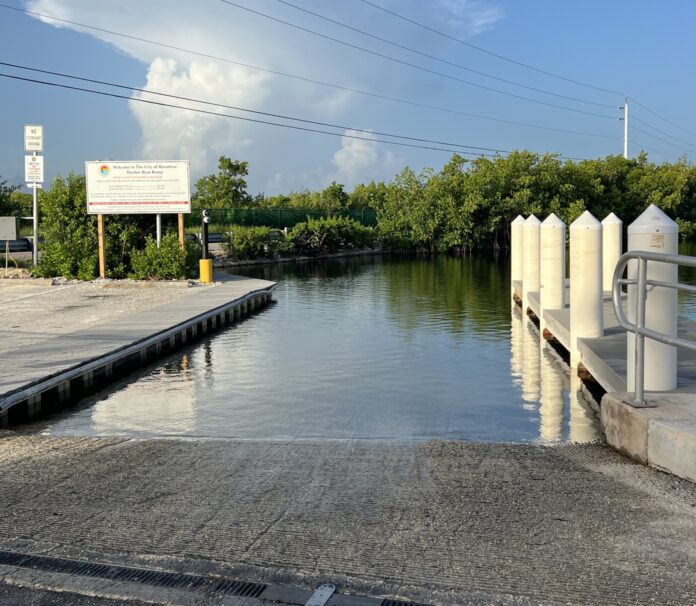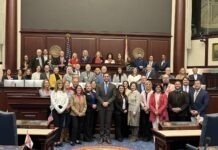
Budgeted raises for city staff, contractor concerns and yet another boat ramp discussion were the centers of civil disagreement for the Marathon City Council at its Aug. 22 workshop.
An agenda item labeled “level of service” drew several contractors to the meeting, wishing to discuss issues with Marathon’s permitting process. However, as clarified by City Manager George Garrett and Planning Director Brian Shea, the agenda item had to do with the city’s ability to continually provide utilities, transportation avenues and vital services with growing development in Marathon, not its customer service practices.
Still, the evening opened with an address from Florida Keys Contractors Association president Armand Messina, who requested a recorded roundtable with city staff to discuss ongoing issues for contractors attempting to close permits.
“There are some permits that have been out there that are taking months to close out, for reasons I’m not familiar with 100%,” he said. “We’re not out here to point fingers at anybody or get anybody fired. … But I want contractors to bring up these issues and discuss whatever we’ve got to do to solve these issues. … And I just want to make sure staff would be present and everything was getting reported back to the council.”
Garrett agreed to set a meeting with the contractors before Aug. 31, with a recap of discussions added to the council’s Sept. 12 meeting agenda.
Messina also questioned City Hall’s locked lobby door, an oft-criticized item he said “really sends the wrong message” to residents seeking open communication with city staff. City Attorney Steve Williams said that while he agreed with the sentiment, the door is a requirement for the city’s insurance company to protect against active shooters, a growing threat throughout the country.
Hotel Redevelopment Ordinance Prompts Concern
Initially up for discussion at the council’s Aug. 8 meeting, councilman Jeff Smith again raised concerns with Ordinance 2023-25 following updates on the city’s current and future wastewater upgrades. In addition to upping the required amount of employee housing provided by hotels and motels – from 20% to 25% of the hotel’s approved floor area in guest units – the new ordinance outlines provisions for redeveloping existing hotel or motel rooms as four-, five- or six-bedroom units, where such redevelopment had previously been limited to three bedrooms.
Under the currently proposed ordinance, single-bedroom hotel units may redevelop as multi-bedroom units, with a corresponding percentage reduction in total units depending on the number of redeveloped bedrooms. For instance, a hotel with 100 one-bedroom units would be allowed to redevelop the rooms as 70 six-bedroom units (70% of units redeveloped), while the same 100 one-bedroom units could also convert to 85 three-bedroom units.
“If I got a 100-unit hotel with 100 bathrooms, and I can now go to 70 units at six bedrooms and probably four or five bathrooms (each), what additional stress will that put on our infrastructure, and can we handle it?” Smith asked. “I think it does us a disservice not to be talking about it today as we look at the impacts of those future redevelopments.”
The updated ordinance is slated for discussion at the council’s Sept. 12 meeting.
Havoc on Harbor Drive
Council opinions remain split on a long-term solution for Marathon’s congested Harbor Drive boat ramp. A new traffic pattern established through the city’s “behind-the-airport” neighborhood has alleviated some congestion at the ramp. But the proverbial jury is still out on a permanent fix and plans for the ramp, with various council members advocating for reopening the ramp’s limited parking spaces (currently closed), discontinuing the new neighborhood traffic pattern due to safety concerns, redeveloping part of the existing parking area as a “pocket park” for use by local families and children, or raising launch fees either permanently or during peak usage times.
As Williams cautioned earlier this month, since Marathon accepted Florida Boating Improvement Program (FBIP) grant funds from FWC for use at the ramp, fee increases there are subject to scrutiny by the state agency. He said that while significant hikes during limited high-stress periods or lower permanent raises may fly in Tallahassee, large permanent increases may not be as lucky.
The council agreed to a formal vote on the ramp’s parking, launch fees and traffic pattern at its Sept. 12 meeting. In the meantime, they instructed Public Works Director Carlos Solis to contact Pave Mobility – the company recently contracted by the city for parking fee collection and ticketed enforcement – to better understand the new system’s ability to levy altered fees on specific days.
Staff Raises Under Scrutiny
Finance Director Jennifer Johnson presented the council with a discussion of the city’s 2023-2024 special revenue, capital projects, debt service and enterprise fund budgets. In addition to $400,000 available for first-time home buyer loans in the city’s special revenue fund, the FY24 budget earmarks nearly $3.5 million in grant reimbursable funds for canal and culvert restoration projects and a stormwater control project on Sombrero Boulevard – the latter of which has drawn increasing ire from residents with road flooding after each rainstorm.
Capital projects budgeted for the coming year include $565,000 in City Hall improvements, $1.5 million for improvements to the newly-purchased Seven Mile Marina, $400,000 in Ocean Front Park improvements (including a potential new pickleball court), $600,000 in 7 Mile Park improvements, $2.58 million in improvements to the Quay property and $1.5 million in Community Park improvements to go along with $3.1 million in budgeted road and bridge improvements.
A budgeted 9.6% cost of living increase for city staff – given in addition to maximum merit raises of $1,500 per staff member – prompted one of the evening’s longest discussions, with Smith going as far as to call the proposed increase “insane.”
“When we first talked about this, I said, ‘Wait a minute. We gave 10% last year and we’re giving 10% this year,’” he said, arguing that regional inflation statistics have been trending down in recent months. “There’s not a business in this community that’s given 20% to its employees in the last two years in this community.”
Councilman Lynn Landry broached the idea of a split increase, allowing a higher increase for employees at lower salaries and a smaller bump for the city’s higher-paid staff. Johnson said that was a possibility, as Islamorada had just last year adopted a 7% increase for employees earning less than $100,000 a year and a 6% jump for those earning more.
“Again, I just need a consensus,” she said.
“I’m happy to discuss raises for people, but I look at our taxpayers and their complaints, and I look at some of the salaries. It’s not that they should be reduced in salary, but they’re far from struggling to live here,” added councilman Kenny Matlock, who similarly proposed a “graduated scale” for increases based on current salaries.
“We are, unfortunately, having to compete with other places for employees,” said Vice Mayor Robyn Still. “What it comes down to is, do we run the risk of losing employees to, say, the school board? … My fear is that qualified employees that help run our city are going to leave for places that are competing for quality employees. I don’t want … our level of service to the community to go down because of that.”
“I think the school board has taken these horses out of the barn, and they’re taking very good care of their employees,” agreed Mayor Luis Gonzalez.
The council tentatively agreed to a 6.9% cost of living increase in addition to merit raises, leaving room for another reduction in September following the release of regional inflation statistics from August.
Future budget workshops are scheduled for Sept. 12 and 26 at City Hall, both beginning at 5:05 p.m.





















